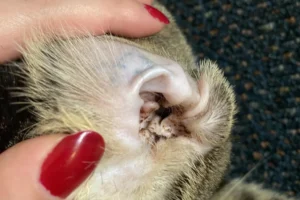Fireworks may bring joy to many during celebrations, but for our furry friends, like cats and dogs, they can be quite terrifying. Have you ever wondered why our beloved pets become scared of fireworks?
Fireworks and Hearing Sensitivity
How do fireworks affect cats and dogs’ sensitive hearing?
Fireworks can have a profound impact on cats and dogs due to their incredibly sensitive hearing. The loud explosions and crackling sounds can be overwhelming for our furry friends, whose hearing is far more acute than ours. Imagine someone suddenly setting off a firecracker right next to your ear – that’s the experience for our pets multiplied many times over.
The intense noise from fireworks can reach decibel levels that are not only uncomfortable for animals but can actually cause pain and distress. This can lead to anxiety, fear, and a fight-or-flight response in cats and dogs. Additionally, the unpredictable nature of fireworks can heighten their stress levels, as they are unable to anticipate when the next loud noise will occur.
Fireworks and Fear Response
What triggers the fear response in cats and dogs during fireworks?
The fear response in cats and dogs during fireworks is deeply rooted in their survival instincts. Animals are naturally wary of loud noises, bright lights, and sudden movements as these are often associated with danger in the wild. Fireworks, with their loud bangs and flashing lights, trigger a primal fear response that tells our pets to be on high alert and ready to flee.
For cats and dogs, the unpredictability of fireworks only serves to heighten their fear. The sudden onset of loud noises and bright lights can make them feel trapped and vulnerable, leading to behaviors like hiding, trembling, panting, pacing, or even trying to escape. It’s important to understand that this fear response is not a choice for our pets – it’s a deeply ingrained instinct that we need to respect and help them manage.
Signs of Distress in Pets:
-Look for signs of distress in your pets such as trembling, hiding, excessive panting, pacing, whining, or trying to escape. -Try to create a safe and comfortable environment for your pets during fireworks by providing them with a quiet, secure space indoors. -Consider using calming aids such as pheromone diffusers, calming sprays, or calming treats to help alleviate their anxiety. -Consult with your veterinarian for additional tips or medications that may help your pet cope with the stress of fireworks.
What are the common signs that cats and dogs are distressed by fireworks?
Fireworks can be a source of anxiety and fear for many pets, causing them to exhibit various signs of distress. Common behaviors that indicate cats and dogs are scared of fireworks include:
- Hiding: Pets may seek out hiding spots in an attempt to escape the loud noises and bright lights of fireworks.
- Shaking: Trembling or shaking is a common physical manifestation of fear in pets.
- Panting: Cats and dogs may pant excessively when stressed, even in cool environments.
- Attempting to Escape: Some pets may try to run away or escape from the source of the fireworks, putting themselves in danger.
If you notice any of these signs in your furry friend during fireworks displays, it’s essential to address their anxiety and help them feel safe.
Managing Fear and Anxiety
During fireworks season, pet owners can take proactive steps to help their cats and dogs feel safe and secure. Here are some tips to assist your furry companions during this stressful time:
- Create Safe Spaces: Set up a comfortable and secure area in your home where your pets can retreat during fireworks displays. This can be a quiet room with their favorite toys, bedding, and treats.
- Use Calming Techniques: Consider using calming products such as pheromone diffusers, calming sprays, or anxiety vests to help alleviate your pet’s stress.
- Provide Distractions: Keep your pets occupied with activities they enjoy, such as playing with toys or receiving treats, to divert their attention from the fireworks.
Additionally, staying with your pet during fireworks shows and offering comfort and reassurance can go a long way in helping them feel safe and secure.
Preventive Measures
To prevent your pets from experiencing extreme distress during fireworks, consider the following preventive measures:
- Gradual Exposure: Desensitize your pets to loud noises by playing recorded fireworks sounds at a low volume and gradually increasing the volume over time.
- Consult a Veterinarian: If your pet experiences severe anxiety during fireworks displays, consult your veterinarian for guidance on potential medications or behavioral therapies.
- Identification: Ensure your pets are wearing collars with updated identification tags or are microchipped in case they escape during a fireworks event.
By taking these preventive measures and implementing strategies to manage your pet’s fear and anxiety, you can help ensure a safer and more comfortable experience for your furry friends during fireworks season.
What preventive measures can pet owners take to help their pets during fireworks?
Fireworks can be a source of stress and fear for many pets, including cats and dogs. As responsible pet owners, there are several steps you can take to help your furry friends feel more at ease during these loud and unpredictable events.
Desensitization Training: Gradually exposing your pet to recorded fireworks sounds at low volumes can help them become more accustomed to the noise over time. This technique, known as desensitization training, can reduce their anxiety when the real fireworks start.
Pheromone Products: Consider using pheromone products, such as sprays or diffusers, which release calming chemicals that mimic natural animal pheromones. These products can help create a sense of safety and security for your pet during stressful situations like fireworks displays.
Consult with a Veterinarian: If your pet suffers from severe anxiety or phobias related to fireworks, it may be beneficial to seek advice from a veterinarian. They can recommend additional techniques or medications to help your pet feel more comfortable during fireworks shows.
Remember, early preparation is key to helping your pet cope with the anxiety of fireworks. By taking these preventive measures, you can ensure a more peaceful experience for your beloved furry companions.
Alternative Options to Loud Fireworks
While fireworks are a cherished tradition for many celebrations, there are alternative ways to celebrate special occasions without subjecting your pets to the stress of loud explosions. Here are some creative ideas to consider:
Light Shows: Opt for a mesmerizing light show instead of traditional fireworks. Laser light displays or LED light shows can be just as dazzling for humans while being less disruptive and frightening for pets.
Silent Fireworks: Some communities now offer silent fireworks displays that use visual effects without the loud noise. These innovative alternatives provide a visually stunning experience without the anxiety-inducing sounds.
Virtual Fireworks: Explore virtual reality fireworks experiences that can be enjoyed from the comfort of your home. These digital displays offer a safe and pet-friendly way to partake in the excitement of fireworks celebrations.
By exploring these alternative options, you can still commemorate special events in a memorable way while ensuring the well-being and comfort of your beloved pets.
Interesting Facts about Pet Behavior
Understanding the reasons behind why cats and dogs are scared of fireworks can help pet owners take proactive steps to support and comfort their furry companions during these challenging times. Here are some insightful facts about pet behavior in relation to fireworks:
Sensitivity to Sound: Cats and dogs have much more sensitive hearing than humans, making loud noises like fireworks particularly distressing for them. The sudden blasts and booms can be overwhelming and frightening to their heightened senses.
Survival Instincts: Pets may perceive fireworks as a threat or danger due to their evolutionary survival instincts. The loud noises and bright lights mimic signs of danger in the wild, triggering a natural fight-or-flight response in animals.
Association with Trauma: Pets can develop a negative association with fireworks if they have experienced a traumatic event in the past, such as getting lost during a fireworks display or being exposed to loud noises without a safe escape.
By recognizing these behaviors and the underlying causes of fear in pets, you can better support and comfort your furry friends during fireworks events. Remember to be patient, understanding, and proactive in helping them feel safe and secure during these challenging moments.
What are some interesting facts about why cats and dogs react to fireworks?
- Heightened senses: Cats and dogs have more sensitive hearing than humans, making the loud noises of fireworks incredibly distressing for them. Dogs, in particular, have a much wider range of hearing frequencies, which means they can hear sounds from fireworks that are far beyond our own capabilities.
- Instinctual fear: Both cats and dogs have a natural instinct to be wary of loud noises, associating them with potential danger in the wild. This instinct is heightened in domesticated pets when they are exposed to sudden, unpredictable sounds like fireworks.
- Fireworks mimic thunder: The booming sound of fireworks can trigger a fear response in pets, as it bears a resemblance to thunderstorms, which can also be anxiety-inducing for many animals.
- Visual discomfort: In addition to the noise, the bright lights and flashing colors of fireworks can be overwhelming for pets with sensitive eyes, further adding to their fear and anxiety.
- Pavlovian response: Over time, pets may develop a conditioned fear response to fireworks if they have had negative experiences in the past, reinforcing their anxiety during future displays.
Safety Considerations
During fireworks displays, it’s crucial for pet owners to take the following safety precautions to ensure the well-being of their furry friends:
- Proper identification: Make sure your pet is wearing a collar with up-to-date identification tags, including your contact information. Consider microchipping your pet as an added precaution in case they become lost during a fireworks event.
- Supervision: Keep a close eye on your pet during fireworks displays, and try to comfort them if they show signs of anxiety. Create a safe space for them to retreat to if they feel overwhelmed.
- Secure confinement: If possible, keep your pet indoors during fireworks shows to minimize their exposure to the noise and lights. Close windows and curtains to reduce sound and visual stimulation. Consider using white noise or calming music to help mask the sounds of fireworks.
- Avoid fireworks exposure: Never bring your pet to a fireworks display. The loud noises and crowds can be frightening and potentially dangerous for them. Instead, opt for a quiet evening at home or plan ahead for your pet’s care if you will be attending an event.
- Consult a veterinarian: If your pet has severe anxiety or phobia related to fireworks, consult with your veterinarian about potential medication or behavioral therapy options to help them cope during these stressful times.
By taking these safety measures, you can help ensure that your beloved pets stay safe and comfortable during fireworks displays.
Alex, a passionate animal lover, has experience in training and understanding animal behavior. As a proud pet parent to two dogs and three cats, he founded AnimalReport.net to share insights from animal experts and expand his knowledge of the animal kingdom.




